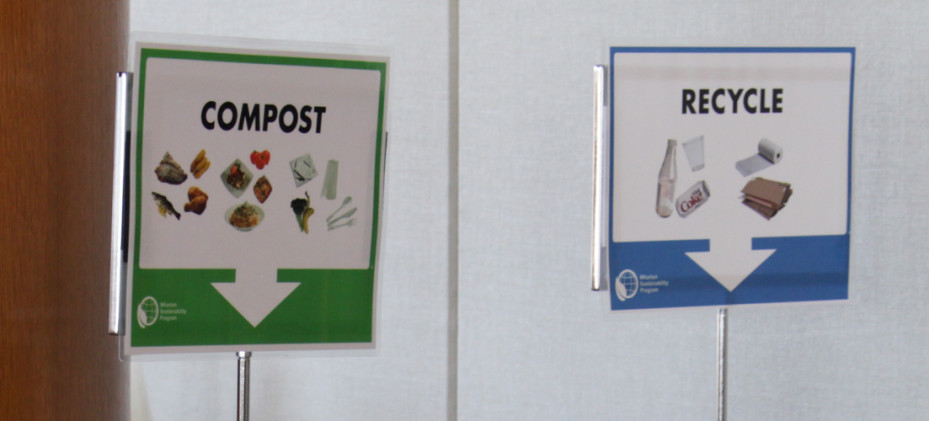Reducing the amount of waste sent to landfills is a community effort, involving students, faculty, and staff. Operations is committed to increasing the percentage and types of campus waste that is recycled and composted.

Recycling stations are located throughout Wharton for the following materials.
Mixed Paper
Mixed paper is the term used for all types and grades of paper. Paper and cardboard are collected together from all buildings on campus. Almost all paper, with a few exceptions, can be recycled.
- Office Paper
- Junk Mail
- Bulk Packs
- Glossy Paper
- Magazines
- Newspapers
- Notebooks
- Catalogs
- Paperbacks
- Brown Paper Bags
- Phone Books
- NO Hardcover Books
- NO Wax Paper (this item is compostable)
- NO Soiled Paper (this item is compostable)
Departments can recycle hardcover book for a fee by arranging a pick-up through Wharton Operations. Contact repair-it@wharton.upenn.edu for more information.
All other hardcover books can be donated to your local library. Many bookstores (including the Penn Bookstore @ 36th and Walnut) offer buy-back opportunities for used textbooks.
Cardboard
Empty and Flatten. Place flattened cardboard boxes next to any recycling bin in the building. This indicates to the housekeeping staff that the box is meant to be recycled.
- Cardboard boxes
- Clean pizza boxes
- Drink and ice cream cartons
- Fiber board (ex: cereal boxes)
- NO Wax-Coated Cardboard (this item is compostable)
- NO Food Soiled Cardboard (this item is compostable)
Glass, Plastics #1 – #7, and Metals
Glass, all plastic, and metals are recyclable materials that are collected together, or “commingled”.
Glass
All glass food and beverage containers (all colors)
Plastics
All plastic containers, wrappers, and bags are now recyclable on campus. Examples include:
- Plastic cups, bottles, and lids
- Shampoo and detergent bottles
- Milk jugs and yogurt containers
- Plastic packaging
- Plastic bags
- Plastic wrap
- Candy and chip wrappers
- NO Foam Products
- Aluminum Cans
- Aluminum Foil
- Empty Aerosol Cans
Metals
Steel & ferrous cans (canned goods, coffee cans, etc.)
Batteries
Federal regulations require battery terminals to be taped or each battery placed in a separate bag before recycling. This is to ensure that the terminals cannot come into contact with each other. This prevents the risk of fire or sparks that can cause significant harm.
- Place CLEAR tape over the terminals/contact points OR
- Place each battery into a CLEAR separate bag.
- Please use clear tape or clear bags only so batteries can be easily identified and sorted for recycling.
E-Waste
WCIT provides a recycling bin outside of its headquarters in Huntsman Hall where students, faculty, staff and visitors can drop off small e-waste to be recycled. The Techno Trash Can accepts laptops, cell phones, cables, MP3 players, digital cameras, hard drives, jump drives and more. For CPUs, monitors and printers, WCIT organizes quarterly drop-off days in which academic and administrative departments can drop off their items to be hauled away and recycled by Elemental. Some departments donate usable equipment to local schools or charities. For details on the University e-waste guidelines, visit here. WCIT is considering a system for tracking all e-waste to ensure compliance with recycling policies.


